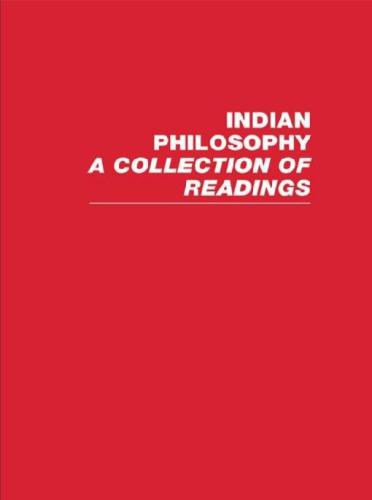

Most ebook files are in PDF format, so you can easily read them using various software such as Foxit Reader or directly on the Google Chrome browser.
Some ebook files are released by publishers in other formats such as .awz, .mobi, .epub, .fb2, etc. You may need to install specific software to read these formats on mobile/PC, such as Calibre.
Please read the tutorial at this link: https://ebookbell.com/faq
We offer FREE conversion to the popular formats you request; however, this may take some time. Therefore, right after payment, please email us, and we will try to provide the service as quickly as possible.
For some exceptional file formats or broken links (if any), please refrain from opening any disputes. Instead, email us first, and we will try to assist within a maximum of 6 hours.
EbookBell Team

5.0
68 reviewsIndian/Hindu philosophy refers to philosophical traditions of the Indian subcontinent. A traditional classification divides orthodox (āstika) and heterodox (nāstika) schools of philosophy, depending on one of three alternate criteria: whether it believes the Vedas as a valid source of knowledge; whether the school believes in the premises of Brahman and Atman; and whether the school believes in afterlife and Devas. There are six major schools of orthodox (astika) Indian Hindu philosophy—Nyaya, Vaisheshika, Samkhya, Yoga, Mīmāṃsā and Vedanta, and five major heterodox (nastika) schools—Jain, Buddhist, Ajivika, Ajñana, and Charvaka. However, there are other methods of classification; Vidyaranya for instance identifies sixteen schools of Indian philosophy by including those that belong to the Śaiva and Raseśvara traditions.
Ancient and medieval era texts of Indian philosophies include extensive discussions on ontology (metaphysics, Brahman-Atman, Sunyata-Anatta), reliable means of knowledge (epistemology, Pramanas), value system (axiology) and other topics.
Indian Philosophy: A Collection of Readings (5 Vol. Set) First Published in 2001. Routledge is an imprint of Taylor & Francis, an informal company. This is Retail ePUB collection of 5 Volumes Re-Published officially in 2013.
Set Containing:-
Volume 1: Epistemology
Volume 2: Logic and Philosophy of Language
Volume 3: Metaphysics
Volume 4: Philosophy of Religion
Volume 5: Theory of Value
Table of Contents:-
Vol. 1: Epistemology
Series Preface
Series Introduction
Volume Introduction
A Fragment of the Indian Philosophical Tradition: Theory of Pramāṇa
Nāgārjuna as Anti-Realist
Introduction to Gaṅge'sa's Theory of Truth
Dharmakīrti's Theory of Truth
Does Indian Epistemology Concern Justified True Belief?
Knowing That One Knows
The Indian Concepts of Knowledge and Self
Padmapāda's Illusion Argument
Dreams and Reality: The Śaṅkarite Critique of Vijñānavāda
Dreams and the Coherence of Experience: An Anti-Idealist Critique from Classical Indian Philosophy
Astitva Jñeyatva Abhidheyatva
The Nyāya on Existence, Knowability and Nameability
Is Whatever Exists Knowable and Nameable?
On Knowing by Being Told
The Nyāya Theory of Doubt
Acknowledgments
Vol. 2: Logic and Philosophy of Language
The Indian Tradition
A Note on the Indian Syllogism
The Concept of Pakṣa in Indian Logic
Negation and the Law of Contradiction in Indian Thought: A Comparative Study
Indian Logic Revisited: Nyāyapraveśa Reviewed
Some features of the technical language of Navya-Nyāya
The Nyāya on Double Negation
The Middle Term
Psychologism in Indian Logical Theory
Tarka in the Nyāya Theory of Inference*
Anekānta: both yes and no?*
Sanskrit Philosophy of Language
Some Indian Theories of Meaning
Reference and Existence in Nyāya and Buddhist Logic*
The Context Principle and Some Indian Controversies over Meaning*
The Sense-Reference Distinction in Indian Philosophy of Language
Bhartṛhari’s Paradox*
Acknowledgments
Vol. 3: Metaphysics
Ontological Problems in Nyāya, Buddhism and Jainism: A Comparative Analysis
Vedāntaparibhāṣā as Systematic Reconstruction
The Nyāya-Vaiśeṣika Theory of Universals
More Things in Heaven and Earth
Negative Facts and Knowledge of Negative Facts
Mereological Considerations in Vasubandhu's ‘Proof of Idealism’ (Vijñaptimātratāsiddhiḥ)
Causality in the Nyāya-Vaiśeṣika School
An Ontology of Concrete Connectors
Dependent Arising and the Emptiness of Emptiness: Why Did Nāgārjuna Start with Causation?
Freedom and Determinism from an Indian Perspective
Reductionist and Nonreductionist Theories of Persons in Indian Buddhist Philosophy
Self-Construction in Buddhism
Buddhist Reductionism
The Mīmāṃsā Theory of Self Recognition
I Touch What I Saw
Dehātmavāda or the Body as Soul: Exploration of a Possibility Within Nyāya Thought.’
An Eccentric Ghost in the Machine: Formal and Quantitative Aspects of the Sāṃkhya-Yoga Dualism
Mind/Consciousness Dualism in Sāṅkhya-Yoga Philosophy
The Self in Advaita Vedānta
The Concept of the Absolute and its Alternative Forms
Acknowledgments
Vol. 4: Philosophy of Religion
Indian Theodicy: Śaṃkara and Rāmānuja on Brahma Sūtra II. 1. 32–36
A “Constitutive” God — An Indian Suggestion
Unity and Contradiction: Some Arguments in Utpaladeva and Abhinavagupta for the Evidence of the Self as Śiva
The World as God's “Body”: In Pursuit of Dialogue With Rāmānuja
A Death-Blow to Śaṅkara's Non-Dualism? A Dualist Refutation
Hindu Doubts About God: Towards a Mīmāṃsā Deconstruction
Principled Atheism in the Buddhist Scholastic Tradition
Buddha and God: A Contrastive Study in Ideas about Maximal Greatness
Reason, Revelation and Idealism in Śaṅkara'S Vedānta
The Question of Doctrinalism in the Buddhist Epistemologists
Rebirth
The Naturalistic Principle of Karma
Karma as a “Convenient Fiction” in the Advaita Vedānta
Notes Towards a Critique of Buddhist Karmic Theory
Inherited Responsibility. Karma and Original Sin
Imperatives and Religion in India
Religion and Politics in India: Some Philosophical Perspectives
Towards a Pragmatics of Mantra Recitation
The Meaninglessness of Ritual
Analysis of the Religious Factors in Indian Metaphysics
Three Myths about Indian Philosophy
Acknowledgments
Vol. 5: Theory of Value
Philosophy of Values
The Myth of the Puruṣārthas
Dharma and Mokṣa
Dharma and Mokṣa
Dharma and Mokṣa from a Conversational Point of View
The Concept of Mokṣa
Is Liberation (Mokṣa) Pleasant?
Authority and Law in Ancient India
The Hindu Philosophy of History
The Significance of Kumarilā's Philosophy
Theory of Non-violence
The Supra-Moral in Religious Ethics: The Case of Buddhism
Egoism, Altruism and Intentionalism in Buddhist Ethics
Indian Aesthetics – 1
Art Experience – 2
The Concept of Rasa
Rasa: Poetry and the Emotions
Abhinavagupta's Aesthetics as a Speculative Paradigm
Catharsis in the Light of Indian Aesthetics
The Aesthetics of Indian Music
Metaphors of Indian Art